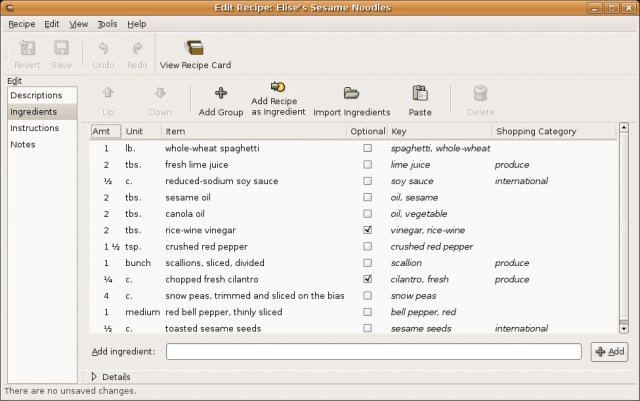Gourmet Recipe Manager is an open source Gtk-based recipe organizer and shopping list generator intended for the GNOME desktop environment (though it does not need all the GNOME libraries).
Gourmet imports recipes from a number of sources, including MealMaster and MasterCook archives and several popular websites. Gourmet can export recipes as text, MealMaster files, HTML web pages, and a custom XML format for exchange with other Gourmet users. Gourmet supports linking images with recipes. Gourmet can also calculate nutritional information for recipes based on the ingredients.
Gourmet includes a copy of the USDA nutritional database, which has thousands of items to calculate nutritional information. It has a plugin architecture which allows you to enable extensions to Gourmet’s base functionality.
Features include:
- Simple searching and sorting.
- Attractive graphical user interface.
- Easy recipe editing.
- Shopping list creator and organiser.
- Wizard to find duplicate recipes.
- Unit calculator.
- Python shell.
- Field editor – edit fields across multiple recipes.
- Key editor – assign and edit ingredient keys (unique identifiers for ingredients, used for consolidating items on shopping lists).
- A “pantry” list to record ingredients that you do not want to shop for.
- Export to:
- PDF.
- HTML.
- XML Export.
- Export.
- Mealmaster.
- Import from:
- Mastercook.
- Website importers (about.com, foodnetwork.com and others).
- Webpage.
- Zip, Gzip and Tarball (import recipes from zip and tar archives).
- Krecipes.
- Plain Text.
- Plugin support adding extra functionality:
- Email recipes from Gourmet.
- Calculate nutritional information for recipes.
- Select recipes by browsing by category, cuisine, etc.
- Cross-platform software.
Website: thinkle.github.io/gourmet
Support: Wiki, GitHub, Mailing List Archives
Developer: Thomas M. Hinkle
License: GNU General Public License v2.0

Gourmet Recipe Manager is written in Python. Learn Python with our recommended free books and free tutorials.
| Popular series | |
|---|---|
| The largest compilation of the best free and open source software in the universe. Each article is supplied with a legendary ratings chart helping you to make informed decisions. | |
| Hundreds of in-depth reviews offering our unbiased and expert opinion on software. We offer helpful and impartial information. | |
| The Big List of Active Linux Distros is a large compilation of actively developed Linux distributions. | |
| Replace proprietary software with open source alternatives: Google, Microsoft, Apple, Adobe, IBM, Autodesk, Oracle, Atlassian, Corel, Cisco, Intuit, SAS, Progress, Salesforce, and Citrix | |
| Awesome Free Linux Games Tools showcases a series of tools that making gaming on Linux a more pleasurable experience. This is a new series. | |
| Machine Learning explores practical applications of machine learning and deep learning from a Linux perspective. We've written reviews of more than 40 self-hosted apps. All are free and open source. | |
| New to Linux? Read our Linux for Starters series. We start right at the basics and teach you everything you need to know to get started with Linux. | |
| Alternatives to popular CLI tools showcases essential tools that are modern replacements for core Linux utilities. | |
| Essential Linux system tools focuses on small, indispensable utilities, useful for system administrators as well as regular users. | |
| Linux utilities to maximise your productivity. Small, indispensable tools, useful for anyone running a Linux machine. | |
| Surveys popular streaming services from a Linux perspective: Amazon Music Unlimited, Myuzi, Spotify, Deezer, Tidal. | |
| Saving Money with Linux looks at how you can reduce your energy bills running Linux. | |
| Home computers became commonplace in the 1980s. Emulate home computers including the Commodore 64, Amiga, Atari ST, ZX81, Amstrad CPC, and ZX Spectrum. | |
| Now and Then examines how promising open source software fared over the years. It can be a bumpy ride. | |
| Linux at Home looks at a range of home activities where Linux can play its part, making the most of our time at home, keeping active and engaged. | |
| Linux Candy reveals the lighter side of Linux. Have some fun and escape from the daily drudgery. | |
| Getting Started with Docker helps you master Docker, a set of platform as a service products that delivers software in packages called containers. | |
| Best Free Android Apps. We showcase free Android apps that are definitely worth downloading. There's a strict eligibility criteria for inclusion in this series. | |
| These best free books accelerate your learning of every programming language. Learn a new language today! | |
| These free tutorials offer the perfect tonic to our free programming books series. | |
| Linux Around The World showcases usergroups that are relevant to Linux enthusiasts. Great ways to meet up with fellow enthusiasts. | |
| Stars and Stripes is an occasional series looking at the impact of Linux in the USA. | |

Gourmet is dead software. Last update was 2014! Move on.
Gourmet scores 5.7 (out of 10). The project appears still to be actively developed, there are lots of commits up to last year.